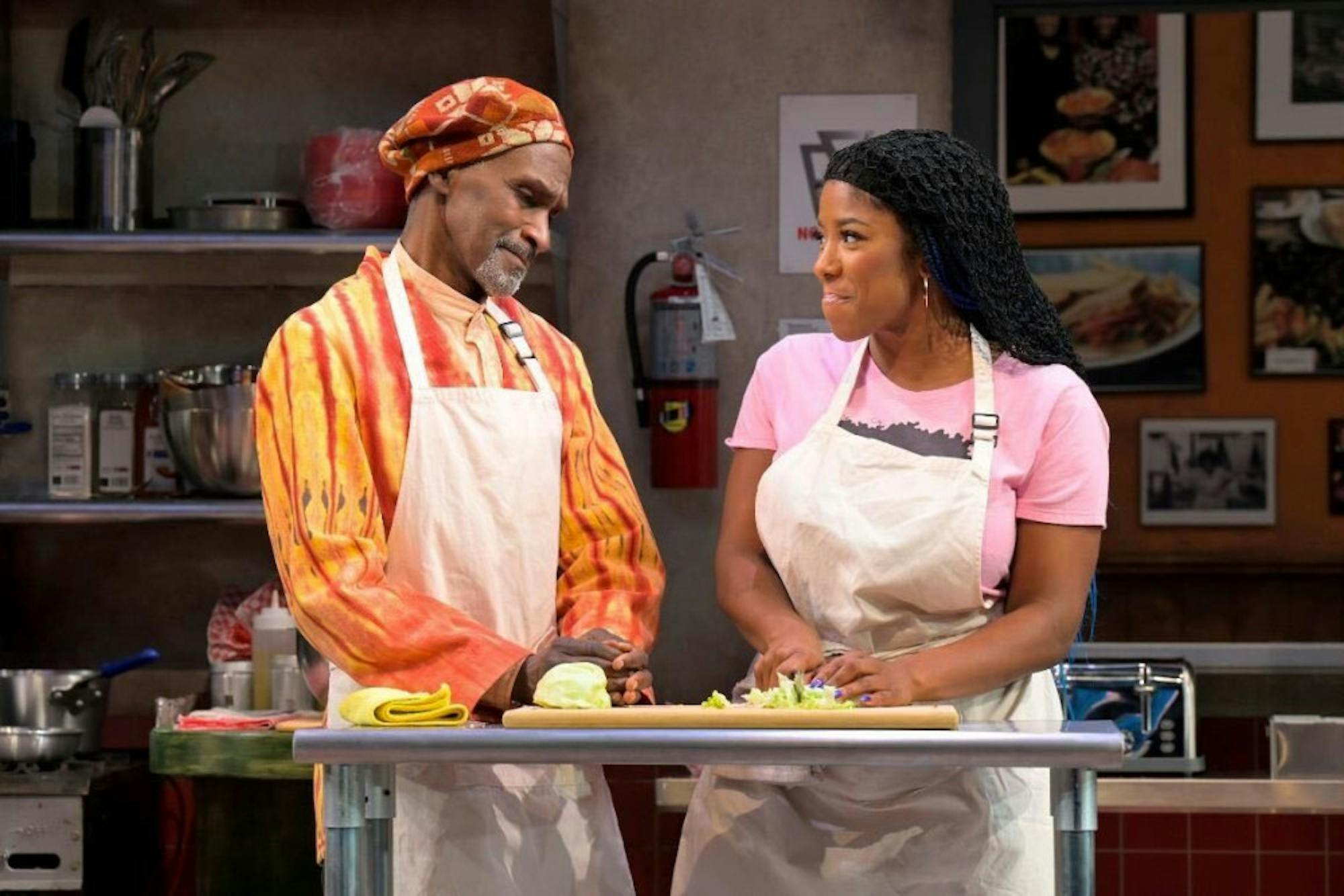What does it take to make the perfect sandwich? And how do you rebuild a life that’s been taken away from you? “Clyde’s” (2021), a new play about the formerly incarcerated kitchen staff of a sandwich shop, seeks to answer both of these questions. Now playing at the Huntington Theatre in Boston through April 23, “Clyde’s” explores the challenges of making a fresh start.
The production, which premiered on Broadway in November 2021 starring Emmy winners Uzo Aduba and Ron Cephas Jones, was nominated for five Tony Awards last year. The show is written by playwright Lynn Nottage, whose Pulitzer Prize-winning plays “Ruined” (2008) and “Sweat” (2015) have also been produced at the Huntington. Co-produced by the Berkeley Repertory Theatre and directed by Taylor Reynolds, the production’s masterful blend of drama and comedy is a joy to watch.
With a five-person cast, “Clyde’s” would not succeed without the impeccable chemistry and comedic timing of its ensemble. At the heart of the story are recovering addict Rafael (Wesley Guimarães) and young mother Letitia (Cyndii Johnson), who find comfort in the kitchen and in each other’s company. Rafael and Letitia are encouraged by Montrellous (Harold Surratt), a wise sandwich chef who acts as their mentor, to create new recipes and live up to their full potential. The three chefs are forced to put up with the demands and insults of Clyde (April Nixon), the diner’s no-nonsense owner who fails to see the good in her employees, constantly reminding them that they will always be defined by their past mistakes.
At the start of the show, the tight-knit relationship of Clyde’s line chefs is shown through the bond between Letitia and Rafael. Johnson and Guimarães have a wonderful connection onstage, exchanging fast-paced lines as they move around the kitchen preparing food without missing a beat. This trust extends to Montrellous, whom Letitia and Rafael look up to with respect and admiration.
The finely-tuned balance of the kitchen is interrupted by the arrival of Jason (Louis Reyes McWilliams), a former white supremacist who immediately poses a challenge to the all-Black kitchen staff. Initially, there is a period of instability as the others get used to his presence. However, as soon as he finds his rhythm and gains the respect of his colleagues, Jason fits in as if he was always there. Once Jason finally participates in the group’s game to create the perfect sandwich, the ensemble truly feels complete. They are not only co-workers trying to take their lives back but also friends who look out for each other.
The intricate design aspects of the show help to further the story. Wilson Chin’s set design evokes the intimate, frenetic experience of working in a diner kitchen, from small details like the horrid red bucket any food service worker knows with terrifying clarity to the large industrial fridge that’s always stocked with sandwiches. Karen Perry’s vibrant costumes bring the characters to life, and Amith Chandrashaker’s lights add tension to key moments in the show.
Nottage’s script lives somewhere in the nebulous world between comedy and drama, which is no easy feat. The fast-paced energy of the kitchen gives way to hilarious mile-a-minute dialogue, with plenty of great one-liners like “Now you’re just disrespecting the lettuce!” and “You think Colonel Sanders didn’t fry up a couple of rats to make ends meet?” But some of the play’s best moments are its most serious, when characters are forced to confront the toll incarceration has taken on their lives. Surratt’s Montrellous is the emotional core of the show, becoming a father figure to Jason at a pivotal moment and delivering a heart-wrenching monologue about the tragic events that landed him in prison.
The kitchen of Clyde’s is an oasis for the chefs, a place where they are able to find meaning and connection. With every failure they face, the characters continue fighting to reclaim their lives, drowning out the voices in their heads that sound eerily like Clyde herself, telling them they are nothing more than their records.
In the final moments of the show, each of the line chefs walks out of the kitchen one by one after combining their talents to make one last sandwich. As the lights start to dim, and Clyde herself realizes that everyone has gone, she picks up the sandwich, lifting it slowly to her mouth before the stage goes dark. We never know for certain if Clyde tried that final sandwich. The ingredients of that “perfect sandwich” aren’t what matters anyway — it’s the love of cooking the chefs have discovered and the relationships they’ve forged that makes all the difference.






